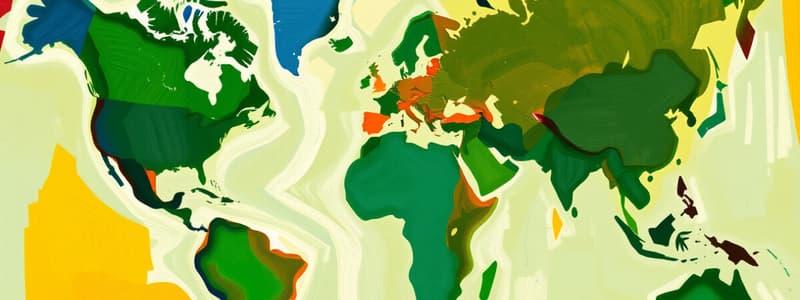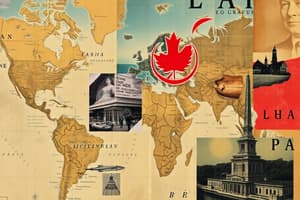Podcast
Questions and Answers
Which key concept defines an area with shared cultural, physical, or political characteristics?
Which key concept defines an area with shared cultural, physical, or political characteristics?
- Location
- Region (correct)
- Movement
- Place
What is the primary focus of physical geography?
What is the primary focus of physical geography?
- Political structures and their implications
- Economic systems and their distributions
- Human activities and cultural patterns
- Natural landscapes and processes (correct)
Which technique involves the analysis of Earth’s data through satellites or aerial images?
Which technique involves the analysis of Earth’s data through satellites or aerial images?
- Cartography
- GIS
- Remote Sensing (correct)
- Topography
What term describes the science and art of making maps?
What term describes the science and art of making maps?
Which of the following areas does human geography explore?
Which of the following areas does human geography explore?
Which of the following is NOT typically a key area of physical geography?
Which of the following is NOT typically a key area of physical geography?
Which theme explores the examination of economies and their spatial distributions?
Which theme explores the examination of economies and their spatial distributions?
What does sustainability refer to in terms of environmental geography?
What does sustainability refer to in terms of environmental geography?
Flashcards are hidden until you start studying
Study Notes
Geography Overview
- Definition: The study of places, the relationships between people and their environments, and the spatial organization of human activities.
Branches of Geography
-
Physical Geography
- Focuses on natural landscapes and processes.
- Key areas: landforms, climates, vegetation, ecosystems, hydrology.
-
Human Geography
- Examines human activities and their relationship with the environment.
- Key areas: urban development, cultural patterns, economic systems, population dynamics.
-
Geographical Techniques
- Methods and tools used in geography.
- Key areas: cartography, GIS (Geographic Information Systems), remote sensing, spatial analysis.
Key Concepts in Geography
- Location: The specific position of a place on Earth (absolute vs. relative).
- Place: The characteristics that make a location unique (physical and human features).
- Region: An area defined by common characteristics (cultural, physical, political).
- Movement: How and why people and goods move from one location to another (migration, trade).
- Human-Environment Interaction: The ways in which humans adapt to and modify their environment.
Tools and Techniques
-
Maps: Visual representations of geographical areas.
- Types: topographic, thematic, political, climate.
-
GIS: A system for capturing, storing, analyzing, and managing spatial data.
-
Remote Sensing: The acquisition of data from satellite or aerial images.
Important Themes
- Cultural Geography: Study of how cultural practices shape and are shaped by geographical spaces.
- Economic Geography: Exploration of the spatial aspects of economies and their distributions.
- Political Geography: Analysis of political structures and their spatial implications.
Key Terms
- Cartography: The art and science of map-making.
- Topography: The arrangement and features of landforms in a region.
- Urban Geography: The study of urban spaces, processes, and issues.
Global Geography
- Continents: Seven major landmasses (Asia, Africa, North America, South America, Antarctica, Europe, Australia).
- Oceans: Major bodies of saltwater (Pacific, Atlantic, Indian, Southern, Arctic).
Environmental Geography
- Climate Change: Study of long-term changes in temperature and weather patterns.
- Sustainability: The ability to maintain ecological balance while meeting human needs.
Careers in Geography
- Urban planner
- Environmental consultant
- Geographic information systems (GIS) specialist
- Cartographer
- Research analyst
Geography Overview
- Study of places, relationships between people and their environments, and spatial organization of human activities.
Branches of Geography
- Physical Geography: Investigates natural landscapes and processes; key areas include landforms, climates, vegetation, ecosystems, and hydrology.
- Human Geography: Analyzes human activities and their environmental interactions; key areas involve urban development, cultural patterns, economic systems, and population dynamics.
- Geographical Techniques: Encompasses methods and tools in geography; key areas include cartography, GIS, remote sensing, and spatial analysis.
Key Concepts in Geography
- Location: Determines a place’s position on Earth, differentiated into absolute and relative.
- Place: Refers to unique characteristics of a location through physical and human features.
- Region: An area identified by common cultural, physical, or political characteristics.
- Movement: Encompasses the dynamics of how people and goods travel, including migration and trade.
- Human-Environment Interaction: Focuses on ways humans adapt to and alter their environment.
Tools and Techniques
- Maps: Visual representations of geographical areas, including types like topographic, thematic, political, and climate maps.
- GIS: Geographic Information Systems are crucial for capturing, storing, analyzing, and managing spatial data.
- Remote Sensing: Involves obtaining data through satellite or aerial imagery for analysis.
Important Themes
- Cultural Geography: Investigates how cultural practices influence and are influenced by geographical spaces.
- Economic Geography: Studies spatial dimensions of economies and their distribution.
- Political Geography: Examines political structures and their spatial ramifications.
Key Terms
- Cartography: The art and science involved in creating maps.
- Topography: Refers to the arrangement and features of landforms in a particular region.
- Urban Geography: Focuses on the dynamics within urban spaces, including processes and issues.
Global Geography
- Continents: Seven primary landmasses: Asia, Africa, North America, South America, Antarctica, Europe, and Australia.
- Oceans: Five major saltwater bodies: Pacific, Atlantic, Indian, Southern, and Arctic Oceans.
Environmental Geography
- Climate Change: Studies long-term changes in weather patterns and temperature.
- Sustainability: Emphasizes maintaining ecological balance to meet both human and environmental needs.
Careers in Geography
- Urban planner: Focuses on land use and urban development.
- Environmental consultant: Advises on environmental best practices and regulations.
- GIS specialist: Manages and analyzes geographic data using GIS technology.
- Cartographer: Designs and creates maps for various uses.
- Research analyst: Conducts geographical research and data analysis.
Studying That Suits You
Use AI to generate personalized quizzes and flashcards to suit your learning preferences.




